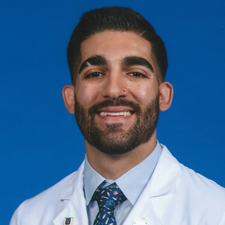At the outset of the pandemic, personal protective equipment (PPE) was in short supply. Putting health care workers in a situation, in some instances, in which they were asked to risk their own safety to treat sick patients without the proper equipment.
How front-line workers handled that situation was a topic of interest to Heerod Malekghassemi, a medical student at Touro University Nevada College of Osteopathic Medicine. His poster on the topic—titled “Should health care workers treat COVID-19 patients despite the inadequate personal protective equipment”—earned him a spot in the AMA Research Challenge.
To advance to the research challenge, Malekghassemi’s poster was selected as the top five poster presentations from the AMA Research Symposium, the largest research event for medical students, residents and international medical graduates, this past December.
To get to five, the research symposium began with 1,000 submissions. Approximately 500 of which were selected for presentation in a virtual Research Symposium poster gallery. Of those, the top scored posters were featured in a poster competition and voted on by participants. The final group of five posters represents the innovative thinking needed to drive medicine forward. The finalists cover a wide variety of topics, including the effects of electronic cigarettes, ventilator access during the pandemic and emotional intelligence in relation to burnout.
The next step in the process—the inaugural AMA Research Challenge—offers the five finalists the chance to present to a group of experts in medicine. The event will premiere on YouTube Jan. 13 at 7 p.m. CT. In advance of that competition, Malekghassemi offered some insight on his project.
AMA: What drew you to your research topic?
Malekghassemi: Research is not something I was initially drawn to. In fact, I intended to spend my summer doing preliminary board prep and enjoying time off. However, with the onset of the pandemic and the mass amounts of misinformation and allegations directed at health care workers, my research partner, Jose Parra, and I felt inspired to educate ourselves and others by gaining insight through those directly involved. We wanted to hear the opinions of the front-line workers, who despite the media and political circus surrounding them, continued to go to work every day to help those in need; many at the expense of their own safety due to lacking PPE. Ultimately beyond spreading information, we wanted to give a voice to those who may have felt unable to share their opinions or concerns, through a safe and anonymous means.
AMA: How have you managed your workload as a medical student as well as your poster research?
Malekghassemi: The bulk of our research was conducted in the summer when we did not have classes, so it was much easier to manage the data gathering and poster creating portions. The current stages of applying to and presenting at competitions have added some stress to our workload but Jose and I have worked out a productive system to share the load and adapt to each other’s schedules to ensure our research receives undivided attention. None of this work would have been possible without him.
AMA: Do you see a connection between your research and an eventual career path?
Malekghassemi: I believe our research is very important for our future career path as health care workers have recently been exposed to some extremely unsafe working conditions without the proper tools and equipment required to both ensure their own as well as patients’ safeties. I have not decided on a specialty yet, as I do not believe in closing doors before they open, however, our work is pertinent to all fields of health care, regardless of specialty, as COVID-19 has impacted all aspects of medicine. I believe the position of being a physician in this pandemic has come with a preconceived notion that they signed up for this job, and though that may be true, we felt it was important to attempt to amplify their voices and open the dialogue to normalize health care provider safety for our future selves as well.
AMA: What is next for your research endeavors?
Malekghassemi: Jose and I have thought to expand our work beyond southern Nevada to gain a larger sample size and build a more thorough answer to our proposed question. It was our goal to initiate conversations, but we aspire to take our work to legislation and ultimately have an impact on laws to avoid any future possibilities of another COVID-19 PPE shortage. As preventative care can help alleviate countless issues in medicine, we believe proper legislation can act in the same vein to prevent shortages of equipment and silencing of those voicing their concerns. We hope our work can lead health care to a better place than when we started and establish productive change.




